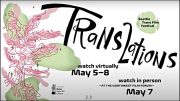By: Jason Lydon*/TRT Columnist—
This month I am writing my column from Detroit, Michigan while attending the 15th Allied Media Conference (AMC). This space has been created for grassroots community organizers and alternative media creators to come together to share resources, build skills and transform our movements. The conference is facilitated and attended by majority people of color, LGBTQ people and women, with explicit attention to media created by marginalized communities. Far too often the dominant media perpetuates oppression when creating representations of queer people, people of color, poor people, people with disabilities, Indigenous people, youth and so many others of us who are silenced. The Allied Media Conference provides space for people to strategize around efforts to challenge mainstream media while sharing our own created media with each other.
The AMC program book reminds attendees the media is more than the television shows we watch. The organizers wrote, “We’ve come to understand media as any tool we use to communicate with the world–whether film, fashion, or community wireless networks. We’ve made media that exposes, investigates and heals, builds confidence and radical hope, incites dialogue and debate. We’ve demystified technology, not only learning how to use it, but how to design and build our own.”
The Rainbow Times functions as a form of queer/LGBT media written by and for queer/LGBT people in New England. As a reader of this newspaper you are engaging in alternative media consumption. When you write Letters to the Editor you are participating in this media and knowledge exchange. Our responsibility is to not allow media to be something done to us, but rather something we are constantly engaged in as active participants.
One of the workshops I attended was facilitated by the Chicago-based Young Women’s Empowerment Project. This organization works with young transgender and cisgender women who are engaged in the sex trade and are often homeless, home-free or street-based. These young women are working with each other in Chicago to create sustaining, life giving, transformative practices that include a peer directed needle exchange, comprehensive community-directed research on structural violence and so much more. They use community created resources, zines and creative outreach materials to communicate their ongoing campaigns. [pullquote]Media depictions of transgender people are most often either as murder/violence victims or as scary monsters of some kind. This effort is created by transgender young people and organized in intentionally intergenerational ways.[/pullquote]
Another workshop was coordinated by the Transgender Oral History Project. This is a national effort based in Chicago that is collecting stories of transgender people to tell their own stories. These stories are being collected on video as well as written zines for people to purchase. Media depictions of transgender people are most often either as murder/violence victims or as scary monsters of some kind. This effort is created by transgender young people and organized in intentionally intergenerational ways.
Media, on a global level, is becoming even more digitized. This year, the AMC had a track for those of us actively engaged in print, entitled “I <3 Print Media.” This track focused on ways community newspapers, organizational newsletters, books, magazines, and other print resources continue to be relevant even as so many people turn to the Web. We can look at local newspapers in Boston and see the essential contributions the Boston Banner continues to have, specifically serving Black communities in the city. Black and Pink, the organization I spend all my time working with, sends a LGBTQ prisoner generated newspaper to 2,700 prisoners across the country. If we lose the strength of print media, it will be nearly impossible to communicate with incarcerated people. The AMC offers organizers opportunities to critically reflect with each other on how their media efforts are challenging the silencing/isolationist nature of mainstream media. While the Gay and Lesbian Alliance Against Defamation gives awards to actors portraying normative gay characters, organizations at the AMC are engaged in efforts to create radical celebratory media “for a more just, creative and collaborative world.” I encourage everyone to learn more about this conference and the efforts of attendees by visiting www.alliedmedia.org.
*Rev. Jason Lydon is a Unitarian Universalist minister in Boston. He is a long time anti-prison organizer and founder of Black & Pink, an LGBTQ-focused effort working toward the abolition of the prison industrial complex. Jason is also an avid lover of famous people and blockbuster action flicks. You can reach Jason at jason@blackandpink.org.








